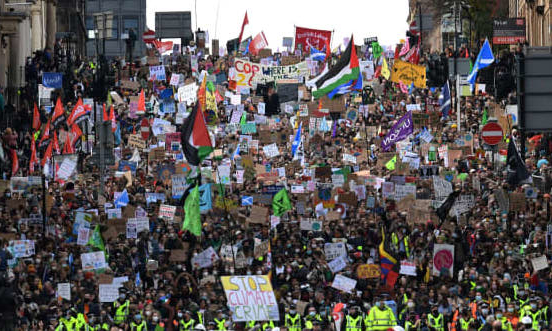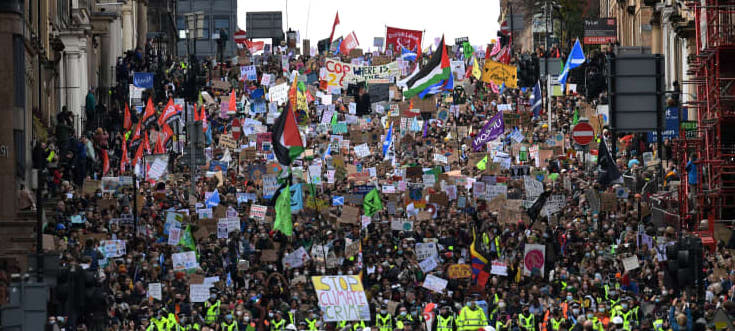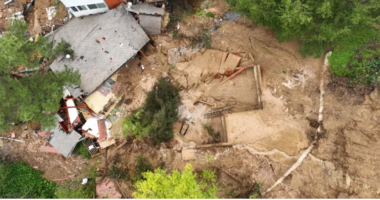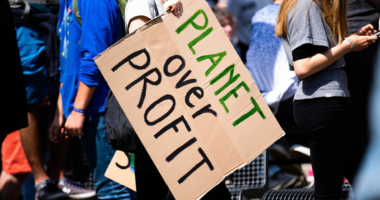Climate, Health and Equity Brief
COP26 secures agreement, yet commitments fall short
November 15, 2021

The Climate, Health & Equity Brief is GMMB’s take on the week’s news on the current impacts of climate change. If you haven’t subscribed yet, you can do so by clicking here.
Hot Topic: Mixed bag. After negotiations that stretched well past Friday’s deadline, diplomats have finally struck a deal on a global climate accord. Reaching unanimous consent among nearly 200 nations wasn’t easy, and the resulting agreement falls far short of the ambitious roadmap needed to limit warming to 1.5°C (2.7°F).
Signatory nations agreed on new rules limiting greenhouse gas emissions, and all countries were urged to cut CO2 emissions in half by 2030. But last-minute objections from China and India thwarted a commitment to end coal use and fossil fuel subsidies, resulting instead in a watered-down pledge to “phase down” rather than “phase out” coal. The agreement also leaves developing countries far short of the funding they need to build cleaner energy or cope with the damage resulting from increasingly common and devastating weather disasters.
An analysis released this week predicts that despite the pledges made at COP26, catastrophic warming of 2.4°C (4.3°F) remains likely—a far more pessimistic outlook than a recent report suggesting commitments could limit warming to 1.8°C (3.2°F). For context, warming to 2°C (3.6°F) would expose one billion people to extreme heat stress.
One bright spot at COP was the surprise announcement between China and the U.S. to work together to increase climate action this decade and to reaffirm their commitment to limiting warming to Paris Agreement targets. The pact calls for “concrete and pragmatic” regulations in decarbonization, reducing methane emissions and fighting deforestation.
Ultimately, governments were urged to return in 2022 with stronger 2030 emissions reduction targets and to double funding to protect poor nations from the perils of a hotter planet. The success or failure of the week’s negotiations now hinges on whether world leaders follow through with new policies to slash emissions, scale-up climate aid, and ultimately increase ambitions and actions enough to put a 1.5°C limit within reach.
— Matt & Traci, GMMB
Human Health
New research announced at COP26 found that one billion people will experience extreme heat stress if planetary temperatures increase by 2°C (3.6°F). (Axios)
Planetary Health
New analysis from Climate Action Tracker predicts that the world will warm 2.4°C (4.3°F) despite the pledges made at COP26, a far gloomier outlook than a recent IEA report that claimed new commitments could potentially limit warming to 1.8°C (3.2°F). (BBC)
A Washington Post analysis found that many countries severely underreport their greenhouse gas emissions, resulting in an annual gap in at least 8.5 billion tons—larger than the yearly emissions of the United States, and approaching China’s annual emissions. (The Washington Post)
Let us end the pollution of hollow words. Let us fight for a livable future and present.”
-Brazilian Indigenous activist Txai Surui
Politics & Economy
Following two weeks of negotiations at COP26, nearly 200 countries achieved consensus on the need to do more to fight climate change and aid vulnerable nations, while leaving many crucial questions—including how much each nation should cut its emissions over the next decade—unresolved. (The New York Times)
The U.S. and China—the world’s two largest economies—came together in a surprise agreement to form a working group to increase climate action in the present decade and to reaffirm their commitment to limiting warming to Paris Agreement targets, recognizing the gap between goals and current policies. (Bloomberg)
While estimates show that climate-related losses in developing countries could reach up to $580 billion per year by 2030, current levels of all humanitarian funding from rich countries that have caused the crisis are less than one-tenth of that, a major sticking point during COP negotiations that has yet to be addressed. (The Washington Post)
More than 500 people with links to fossil fuel interests were found to be accredited for COP26, making the fossil fuel industry the largest delegation at the Glasgow climate talks. (BBC)
A new report found that renewable energy in the U.S. has nearly quadrupled in the past decade, and if the current growth rate continues, renewables could meet current U.S. electricity demand levels by 2035, in line with President Biden’s goal for a fossil-fuel-free energy grid. (The Washington Post)
A new analysis of China’s pledge to end foreign financing of coal power projects could reduce global carbon dioxide emissions by 594 million tons—more than the annual emissions of Canada. (Bloomberg)
The Department of Energy announced its latest Earthshot program, seeking to drastically cut the cost of carbon capture technologies, as it becomes clear that current efforts to reduce greenhouse gases may not be enough to avoid catastrophic warming without the ability to remove carbon from the air. (The New York Times)
A New York City program is promoting the installation of cool roofs—rooftop coatings that mitigate the effects of increasing temperatures by reflecting heat instead of absorbing it, thus reducing the urban heat island effect. (The New York Times)
Equity
As island nations call on major economies for climate mitigation aid at COP26, the nations of Antigua and Barbuda and Tuvalu are seeking damages from the world’s largest emitters through the International Court of Justice. (Axios, CBS News)
Action
Ford, General Motors, Mercedes-Benz, and Volvo were among six automakers and 30 countries that pledged to phase out sales of new gasoline and diesel-powered vehicles by 2040, though experts were disappointed that the U.S., China, Japan and automakers including Toyota, Volkswagen, and the Nissan-Renault alliance did not join the pledge. (The New York Times)
More than 40 countries committed to reducing carbon dioxide emissions in their domestic healthcare industries, a significant move in a sector that accounts for five percent of emissions worldwide. (The New York Times)
Young indigenous activists from across the world joined together at COP26 to bring attention to how the climate crisis is affecting their communities and demanding an end to fossil fuel investments and reparations for Indigenous communities. (NPR, Business Insider)
Kicker
Want to check out the new COP26 climate accord for yourself? Read the full text here.
The GMMB Climate, Health & Equity Brief would not be possible without the contributions of the larger GMMB California team—Aaron Benavides, Elke Cortes and Stefana Simonetto. Feedback on the Brief is welcome and encouraged and should be sent to CHandEBrief@gmmb.com.






